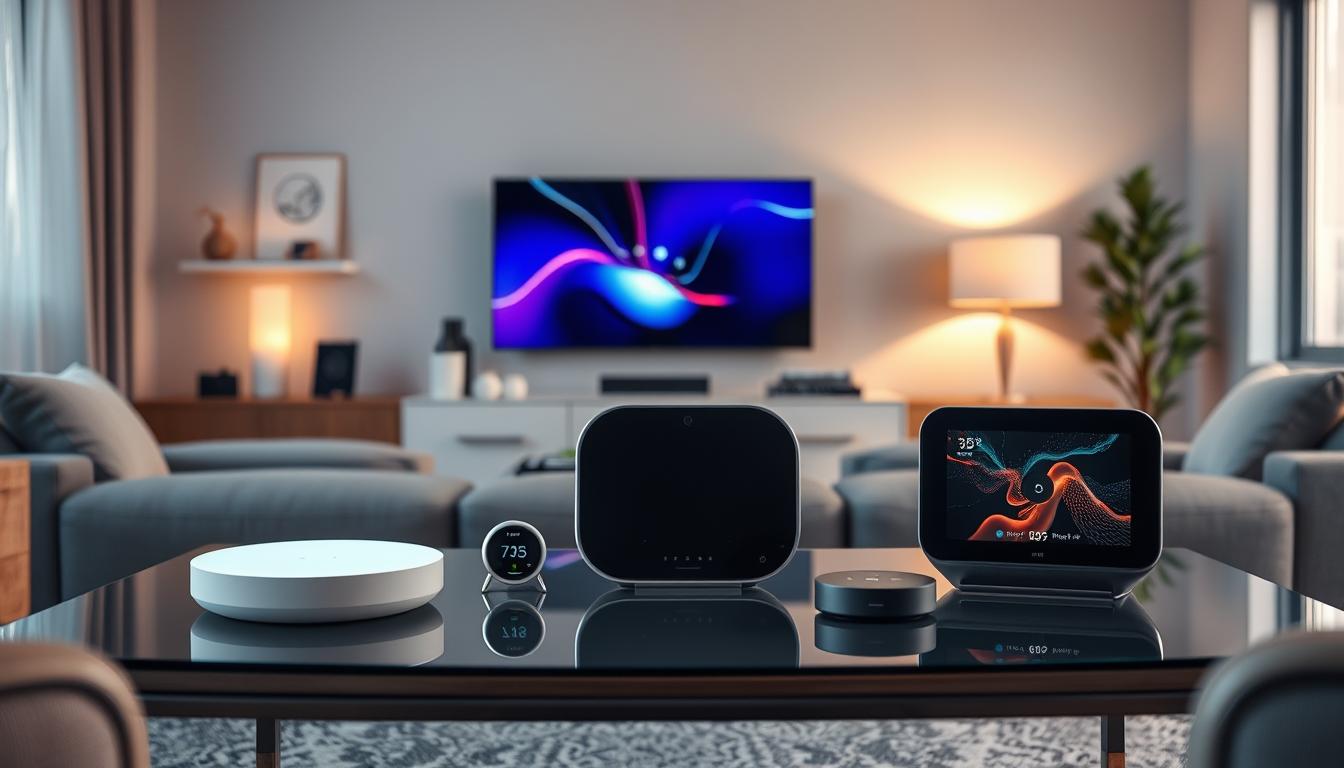I’m looking to upgrade my home with smart technology. I’m comparing smart home hubs to find the right one for me. There are many options, making it hard to choose.
I want to make a smart choice. So, I’m looking at the key features and benefits of different hubs. This includes comparing various smart home systems.
I aim to find a hub that works well with my current devices. I want to control and monitor my home easily. By comparing hubs, I hope to enhance my smart home experience.
This will bring me convenience and efficiency. I’m looking to find the best system for my lifestyle.
What is a Smart Home Hub?
A smart home hub is a central device that connects and controls many smart devices in your home. It makes managing and automating your smart home easy. When looking for the best smart home hubs, think about the features that are important to you.
Reviews say a good smart home hub should work with many devices. This includes lights, thermostats, and security cameras. This way, you can control everything from one place, making your smart home easy to manage.
Definition and Functionality
A smart home hub connects your devices to the internet, letting you control them from anywhere. It can also do tasks automatically, like turning on lights when you enter a room. Or it can adjust the temperature when you leave.
Benefits of Using a Smart Hub
Using a smart hub makes your life easier, saves energy, and boosts security. It lets you control all your devices from one spot. This makes managing your smart home simple. It also helps save energy and keeps your home safe.
Popular smart home hubs come from Samsung, Apple, and Google. When picking a smart home hub, read reviews and think about what features you need. This way, you can find the perfect smart home hub for you and enjoy its benefits.
Popular Smart Home Hubs on the Market
Choosing the right smart home hub is important. There are many top smart home hubs to pick from. Each hub has its own features and benefits. Let’s look at some of the most popular ones.
Some of the top smart home hubs include:
- Amazon Echo Plus
- Google Nest Hub
- Apple HomePod Mini
These hubs offer different features like voice assistants and device compatibility. Think about what you need for your smart home.
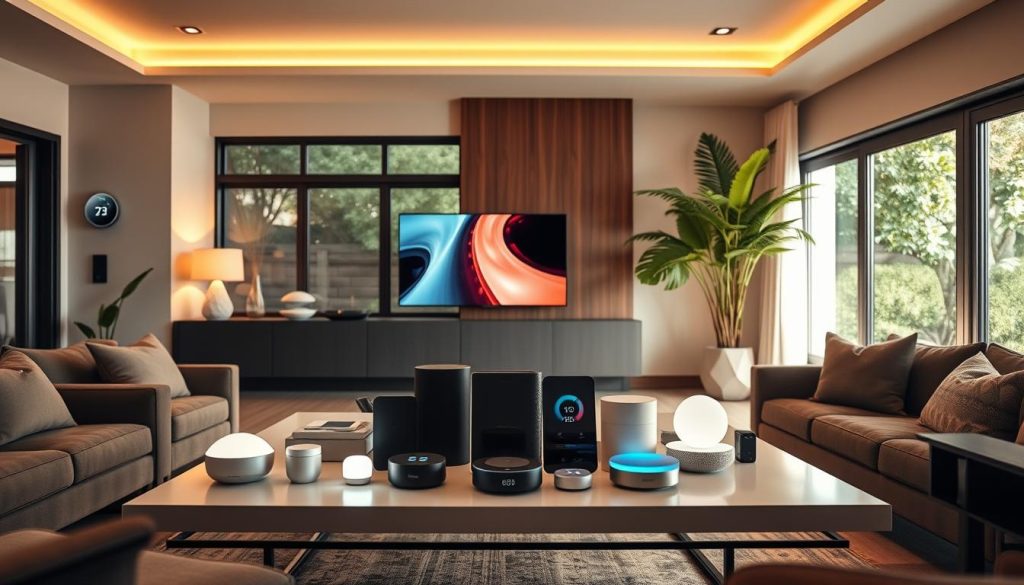
By looking at these hubs, you can choose the best one for your home. This guide will help you compare and find the right smart home hub for you.
Key Features to Consider
When picking a smart home hub, think about a few key things. These features can greatly affect how well the hub works and how easy it is to use. We’ll look at smart home hub compatibility, options, and features.
One important thing is how well the hub works with different devices. This includes things like thermostats and security cameras. Also, being able to control devices with voice commands is a big plus.
Compatibility with Devices
It’s key for a smart home hub to work well with many devices. Look for hubs that work with lots of devices from well-known brands. This lets you control everything from one place.
Voice Assistant Integration
Voice control is another big feature. It lets you use voice commands to control your devices. This makes it easy to turn on lights or change the thermostat. Amazon Alexa and Google Assistant are popular choices.
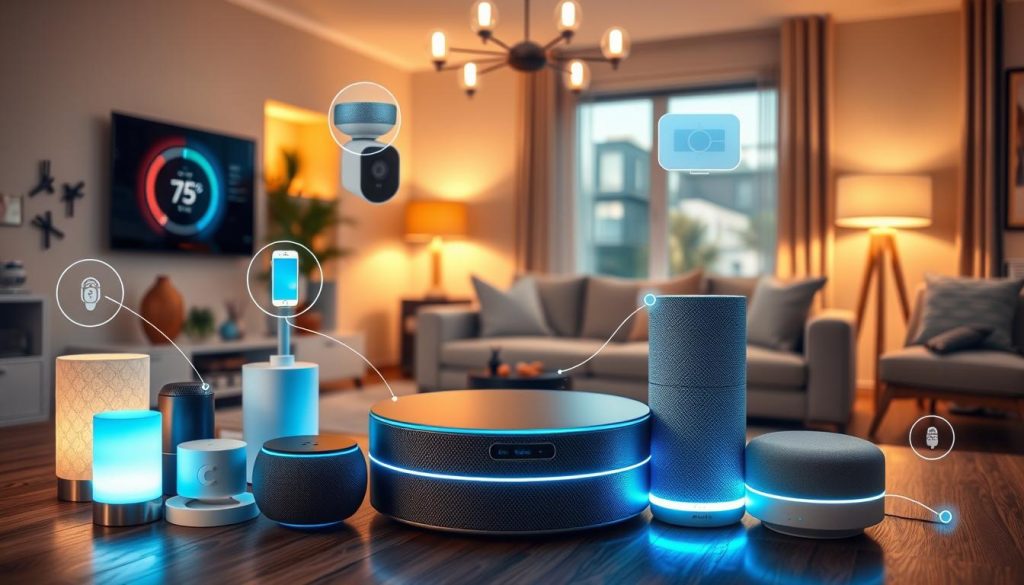
User Interface and Ease of Use
A good user interface is crucial. Choose hubs with easy-to-use interfaces. A well-designed interface can really enhance your smart home experience.
Security Features
Security is very important for smart home hubs. Look for hubs with strong security, like encryption and two-factor authentication. These help keep your devices and data safe from hackers.
By focusing on these features, you can find a smart home hub that fits your needs. Whether you’re looking for compatibility, options, or features, there’s a hub out there for you.
Comparing Ecosystems: Amazon, Google, and Apple
When looking at smart home hubs, it’s key to think about the ecosystems they’re part of. Amazon, Google, and Apple lead the smart home market. Each has its own special features and perks. Knowing how these ecosystems compare can help you pick the best smart home hub for you.
Looking at device compatibility is important when comparing smart home systems. Amazon’s Alexa works with many devices, like smart lights and security cameras. Google’s Assistant also integrates well with various devices, including Nest products. Apple’s HomeKit is more exclusive but still offers a good selection of compatible devices.
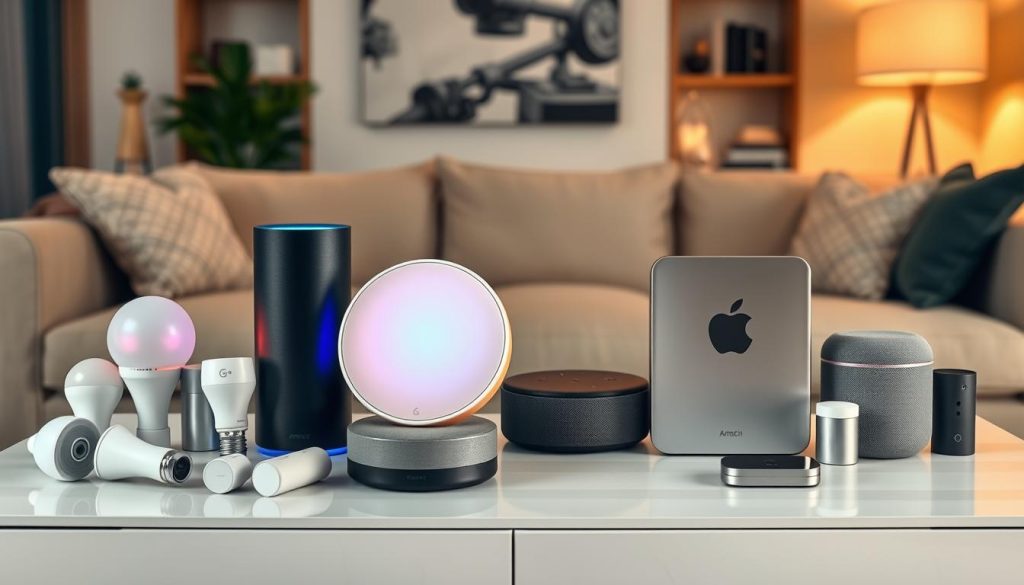
Choosing a single ecosystem for your smart home can make things simpler. It lets you control all your devices with one voice assistant. To decide, you should look at each ecosystem’s features, benefits, and what devices it works with. Pick the one that matches your needs and likes best.
- Amazon’s Alexa ecosystem offers a wide range of compatible devices and skills.
- Google’s Assistant ecosystem provides seamless integration with various devices and services.
- Apple’s HomeKit ecosystem offers exclusive compatibility with Apple devices and a range of smart home products.
In conclusion, comparing smart home hubs and their ecosystems is vital for finding the right solution. By examining each ecosystem’s features, benefits, and compatibility, you can make a smart choice. This will help you create a seamless smart home experience.
Setting Up Your Smart Home Hub
To start with your smart home hub, follow the manufacturer’s instructions closely. This ensures a smooth setup and helps avoid common problems. Think about the features you need, like device compatibility and voice assistant support, when picking the best hub.
Many smart home hub reviews say setting it up is easy. But, some users might face issues with connectivity or device matching. Always read the user manual and troubleshooting guide to solve these problems.
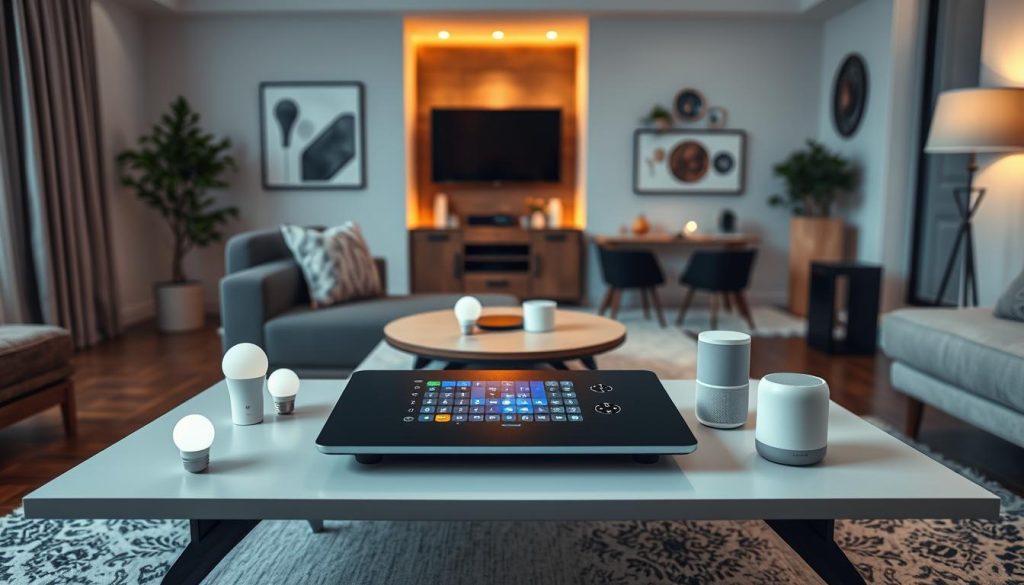
- Unbox and physically set up your smart home hub
- Download and install the accompanying app
- Connect your smart home hub to your Wi-Fi network
- Start adding your devices and customizing your smart home experience
By following these steps and focusing on the hub’s key features, you can build a smart home that suits your needs. Make sure to check out smart home hub reviews to find the right one for your home.
Cost Analysis of Smart Home Hubs
Choosing the right smart home hub is crucial, and cost is a key factor. With many options available, it’s hard to pick the best one for your budget. You need to compare smart home systems carefully.
Think about more than just the initial cost. Consider the long-term savings and benefits. Some hubs may cost more upfront but save you money and time in the long run.
Initial Purchase Cost
The cost of a smart home hub varies a lot. It depends on the brand, model, and features. When comparing, remember to include the cost of the hub and any extra devices or accessories.
Long-Term Savings and Investment
Don’t forget about long-term savings and benefits. Some hubs can lower your energy bills. Others can make your life easier and help you save resources.
When choosing a smart home hub, consider both the upfront cost and long-term savings. This way, you can find a hub that fits your needs and budget. Whether you’re comparing systems or looking for the best hub, weigh the costs and benefits of each option.
Personalizing Your Smart Home Experience
Exploring smart home technology shows how key personalization is. With many smart home hubs out there, picking the right one is crucial. It should match your needs for convenience, energy saving, and security.
Custom Routines and Automations
My smart home hub lets me make custom routines and automations. For example, I can set a “good morning” routine. It turns on lights, adjusts the thermostat, and plays my music. This is thanks to the hub’s ability to work with many devices smoothly.
Integration with Other Smart Devices
Integrating my smart home hub with other devices is vital. It lets me control and watch all my devices from one place. This makes managing my smart home easier. The hub’s compatibility with various devices means I can pick what works best for me, without worrying about compatibility problems.
Some popular smart home devices that work with a smart home hub include:
- Smart thermostats
- Smart lighting systems
- Security cameras
- Door locks
By personalizing my smart home, I get a more convenient, efficient, and secure space. The right smart home hub and devices help me create a space that fits my unique needs and preferences.
| Smart Home Device | Compatibility | Features |
|---|---|---|
| Smart Thermostat | Compatible with most smart home hubs | Temperature control, scheduling, energy monitoring |
| Smart Lighting System | Compatible with most smart home hubs | Color changing, dimming, scheduling |
| Security Camera | Compatible with most smart home hubs | Motion detection, video recording, alerts |
The Role of Privacy in Smart Home Technology
When looking at smart home hubs, privacy is key. As we add more devices, the chance of data breaches grows. It’s vital to know how to keep your data safe and manage privacy settings.
When comparing smart home hubs, look for those that focus on data security and privacy. This ensures your personal info stays protected. It makes your smart home a safer place.
Important privacy features to check include:
- Data encryption
- Secure authentication protocols
- Regular software updates
- Transparent data collection and usage policies
By looking at these features, you can choose the best smart home hub for your home. Always put data security first and manage your privacy settings. This way, you’ll enjoy a safe and smart home experience.
| Smart Home Hub | Data Encryption | Secure Authentication |
|---|---|---|
| Amazon Echo Plus | Yes | Yes |
| Google Nest Hub | Yes | Yes |
| Apple HomePod Mini | Yes | Yes |
Troubleshooting Common Issues
Exploring smart home hubs, I’ve found some common problems. It’s key to know how to fix these issues for a smooth experience. A good smart home hub offers many features, which you can learn about through reviews.
For connectivity issues, I start by checking my internet. If it’s stable, I restart my hub and try to reconnect. I also ensure my hub works with my devices, as incompatibility can cause problems.
Device Compatibility Challenges
To solve device compatibility issues, I research my devices’ compatibility with my hub. I also read reviews to see if others faced similar problems. This helps me pick the best devices for a seamless smart home setup.
Other troubleshooting tips include updating firmware and resetting the hub. I also refer to the user manual or online help. By following these steps and staying updated, I can have a trouble-free smart home experience.
Future of Smart Home Hubs
Looking ahead, I’m excited about the trends and predictions for smart home hubs. To find the best options, we need to watch for new innovations and advancements.
When picking a smart home hub, I look at things like compatibility and voice assistant integration. The future will bring more seamless control and customization, making our smart homes easier to manage.
Emerging Trends in Smart Home Technology
New trends include artificial intelligence, machine learning, and the Internet of Things (IoT). These will help smart home hubs learn and adapt to our habits, offering a more personalized experience.
Predictions for Smart Home Hubs
Experts predict more voice assistants, better security, and lower prices. As technology advances, we’ll see even more features in top smart home hubs.
To choose the right smart home hub, I’ll keep an eye on these trends and predictions. Staying updated on smart home tech will help me pick the best hub for my lifestyle.
| Smart Home Hub | Features | Pricing |
|---|---|---|
| Amazon Echo Plus | Voice assistant, smart home control, music streaming | $149.99 |
| Google Nest Hub | Voice assistant, smart home control, video display | $129.99 |
| Apple HomePod Mini | Voice assistant, smart home control, music streaming | $99.99 |
Making My Final Decision
After looking at many smart home hubs, I’ve picked the best one for my home. I made sure it meets my needs and fits my style.
Analyzing My Needs and Preferences
I thought about a few things. Like how well it works with my devices. And the features that matter most to me. Plus, I looked at the options that match my lifestyle and budget.
Selecting the Right Hub for My Home
After comparing each hub, I chose the [insert hub name]. It works great with my devices, is easy to use, and keeps my home safe. It’s perfect for making my home smarter and more convenient.
I’m eager to start using my new smart home hub. It will make my home more efficient and secure. I’m excited to see how it will improve my daily life.

